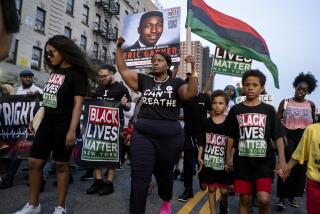More Successful Later Than Non-Veterans : Army Is a Shot in the Arm for Blacks
- Share via
BOSTON — Young blacks with military service are more successful than black non-veterans in seeking and keeping jobs in the private sector, a new study shows.
With blacks now totaling 30% of Army recruits, researchers said the “Be All You Can Be” military has become a way for them “to escape the inordinately high black youth unemployment rate” and prepare for private jobs after their service years.
“Blacks are going into the military because it is a great place to start, and there is a lot more job opportunity than they can find in the private sector. There is something besides job skills that employers are willing to pay for,” said Paul J. Andrisani, director of Temple University’s Center for Labor and Human Resource Studies.
“It is the regimen, the discipline, the leadership skills, the willingness to do hard work,” Andrisani said. “I think there is a credential effect going on. For black kids, this is an important signal to employers that these are job candidates you can trust.”
The study involved young men who went into the Army in the mid-1970s, stayed for at least three years and emerged in the late 1970s and early 1980s. It found that black veterans entered the job market with an $842-annual wage differential over non-veterans.
The findings by Andrisani and retired Army Col. Robert L. Phillips, chief architect of the all-volunteer Army, were presented in March to the Eastern Economic Assn.
Andrisani said the research also showed that black veterans did not have the transitional problem, called frictional employment, that white veterans did in adjusting to the workday world. It appears to be the same kind of job and career uncertainty that many high school graduates go through.
“It may just be that the white veterans just postponed that transition from school to work. Black veterans didn’t do that. They started right out in terms of employment,” Andrisani said. “The white kids can afford to hold out longer and shop around for jobs. Blacks, given a choice of unemployment or a wage, will take the wage.”
The study also found that blacks had greater job satisfaction within the Army, and were 1 1/2 times more likely to re-enlist than whites.
“Relative to the civilian sector, the military is perceived as offering far more equitable employment opportunities to blacks,” Andrisani said.
Before the advent of the all-volunteer force 14 years ago, blacks were under-represented in the Army. They made up 4.1% of the manpower during World War II, 13% during the Korean conflict and 18% during the Vietnam War. Now, blacks compose one-third of the Army. Department of Defense statistics for 1987 show young blacks, who total less than 14% of America’s youth population, account for 22% to 36% of annual Army enlistments.
“To the extent the armed forces are viewed as equal opportunity employers, with low amounts of discrimination, and a place to possibly obtain skill training for civilian life, blacks are willing to join in disproportionate numbers,” the study said.
The report said the Army should do more to put blacks into positions requiring technical skills and in providing promotional opportunities. It found that blacks tend to be assigned more to clerical, unskilled service and support jobs.
Phillips, former director of Army recruiting operations and now associate dean for research at Texas Tech University’s College of Business Administration, said far more must be done by the military in terms of affirmative action.
He also suggested an affirmative-action program--a series of brief, but intensive preparatory courses--to assist minority enlistees in developing an aptitude for higher-skilled jobs.
More to Read
Sign up for Essential California
The most important California stories and recommendations in your inbox every morning.
You may occasionally receive promotional content from the Los Angeles Times.










